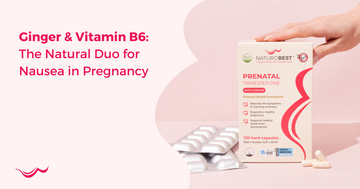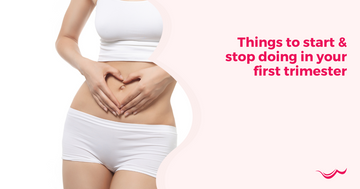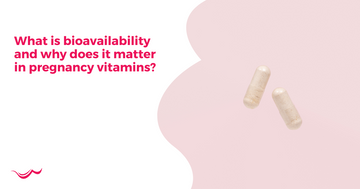
You’re pregnant, yay! Congratulations!
Unfortunately, around week 6 of pregnancy, the symptoms of morning sickness can start to kick in.
When does morning sickness stop?
It usually subsides around week 14-16 of pregnancy although for some unfortunate women, it can continue until bubs is born.
Here are a few tips that may help you find relief from morning sickness
Any woman who has suffered from morning sickness knows that it is absolutely debilitating. It affects a woman's ability to work and has a psychological, emotional and social impact on women and their families.
Up to 85% of women suffer from morning sickness. This varies from mild to severe nausea and vomiting several times a day. Severe morning sickness is otherwise known as hyperemesis gravidarum.
There are several known factors which can increase the likelihood of morning sickness. Some factors are unavoidable such as being aged under 24, having a girl, or carrying twins (or more!).
The good news is, some factors are avoidable
Iron supplements can aggravate the symptoms of nausea and vomiting in pregnancy. However, the majority of prenatal supplements contain iron. This is because iron supplementation is essential later on in pregnancy due to the increase in blood volume.
In the first-trimester, iron supplementation is usually unnecessary, especially if a woman has followed a preconception care plan and boosted her iron stores prior to conception.
The pregnancy hormone, hCG, stimulates a woman’s thyroid in the first trimester. This is known to aggravate the symptoms of morning sickness.
The recommended daily intake of iodine in pregnancy is 220 micrograms. This should come from her diet and she can supplement as well. This is the amount found in NaturoBest's Prenatal Trimester One with Ginger.
It is possible that if she takes high doses of iodine during pregnancy, her thyroid could become overstimulated and lead to an increase in nausea and/or vomiting.
Severe morning sickness
Hyperemesis gravidarum is associated with helicobacter pylori, a spiral-shaped bacterium in the digestive tract. It is common, infecting over 30% of the population.
Hopefully, helicobacter pylori would have been detected and treated prior to conception. If you are suffering from severe morning sickness. It is a good idea to ask your GP for a urea breath test when you have stopped breastfeeding. This test is contraindicated during pregnancy or breastfeeding.
Tips to ease the symptoms of morning sickness
75mg of vitamin B6 and 1300mg of ginger taken daily have been found in several randomised controlled trials to reduce the frequency and severity of nausea and vomiting in pregnancy.
The type of vitamin B6 often used in supplements is pyridoxine hydrochloride rather than the activated form, pyridoxal-5-phosphate (the type that naturally occurs in food). However, it was pyridoxine hydrochloride that was used in the studies and it is possible that 75mg of pyridoxal-5-phosphate could be too much B6 in pregnancy.
People who lack pyridoxal kinase, the enzyme that converts pyridoxine hydrochloride to pyridoxal-5’-phosphate need to take pyridoxal-5’-phosphate. Pyridoxal kinase is activated by zinc and magnesium so a lack of those minerals also inhibits conversion.
Stabilising blood sugar helps reduce symptoms of morning sickness
Eat frequently, preferably every 2 hours. Try snacking on almonds and other nuts to stabilise blood sugar. Increase foods high in chromium such as apples, raisins, nuts and cheese.
It’s a good idea to eat something high in protein just before bedtime. This will help prevent blood sugar from dipping too low overnight. Nuts or yoghurt are especially helpful for protein intake.
Keep some seeded crackers or ginger biscuits next to your bed to eat before getting up in the morning.
There are several nutrients that help maintain healthy blood sugar levels. These include chromium and biotin. Other nutrients involved in carbohydrate metabolism include vitamins B1, B2, B3, B5, B6, B12, magnesium, manganese and zinc.
Ginger
Ginger is a traditional remedy for morning sickness. It has been shown in several studies to be effective at a dose of at least 1000mg daily. Prenatal Trimester One with Ginger contains 1300mg in a daily dose.
Due to its blood-thinning activity, you should be cautious when taking ginger with other blood-thinning medication such as aspirin or supplements such as fish oils and CoQ10.
Chewing on crystallised ginger or drinking ginger tea during the day may help to ease symptoms. Chamomile or peppermint tea may also be helpful.
During my last pregnancy, I found that eating a cube of crystallised ginger helped my nausea disappear within 5 minutes! Although, I did need to do this quite a few times during the day.
Carry some Quick Eze in your handbag as neutralising stomach acids can help to relieve nausea.
If you are constipated, try having 2 kiwifruits at night to gently stimulate your bowels. Relieving constipation can help reduce nausea.
Morning sickness remedies
NaturoBest Prenatal Trimester One with Ginger is a high-quality prenatal multivitamin and mineral supplement specially formulated to reduce morning sickness. It contains 1300mg of ginger and 75mg of vitamin B6 including the activated form of B6, pyridoxal-5-phosphate to reduce morning sickness.
It also contains 500mcg of the highest quality folate on the market, Quatrefolic®, to support healthy foetal brain development alongside other essential nutrients for the first trimester.




